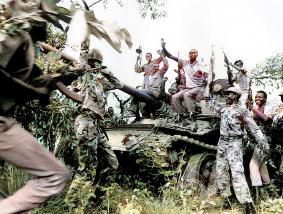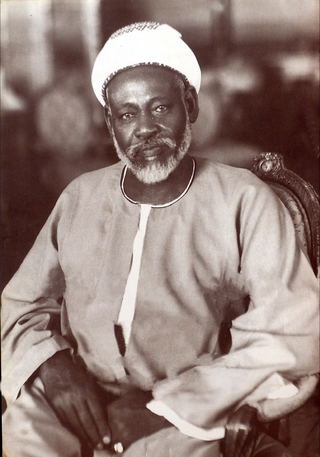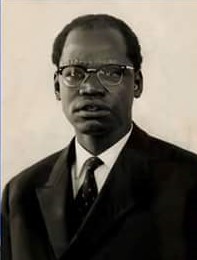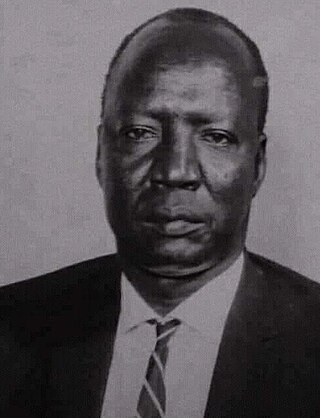Related Research Articles

The Second Sudanese Civil War was a conflict from 1983 to 2005 between the central Sudanese government and the Sudan People's Liberation Army. It was largely a continuation of the First Sudanese Civil War of 1955 to 1972. Although it originated in southern Sudan, the civil war spread to the Nuba mountains and the Blue Nile. It lasted for almost 22 years and is one of the longest civil wars on record. The war resulted in the independence of South Sudan 6 years after the war ended.

General Ibrahim Abboud was a Sudanese political figure who served as the head of state of Sudan between 1958 and 1964 and as President of Sudan in 1964; however, he soon resigned, ending Sudan's first period of military rule. A career soldier, Abboud served in World War II in Egypt and Iraq. In 1949, Abboud became the deputy Commander in Chief of the Sudanese military. Upon independence, Abboud became the Commander in Chief of the Military of Sudan.

The historyofAnglo-Egyptian Sudan refers to the history of Sudan from 1899 to 1955.

The Republic of Sudan was established as an independent sovereign state on 1 January 1956 upon the termination of the condominium of Anglo-Egyptian Sudan, over which sovereignty had been vested jointly in Egypt and the United Kingdom. Before 1955, however, whilst still subject to the condominium, the autonomous Sudanese government under Ismail al-Azhari had temporarily halted Sudan's progress toward self-determination, hoping to promote unity with Egypt. Despite his pro-Egyptian National Unionist Party (NUP) winning a majority in the 1953 parliamentary elections, Azhari realized that popular opinion had shifted against such a union. Azhari, who had been the major spokesman for the "unity of the Nile Valley", therefore reversed the NUP's stand and supported Sudanese independence. On December 19, 1955, the Sudanese parliament, under Azhari's leadership, unanimously adopted a declaration of independence that became effective on January 1, 1956. Azhari called for the withdrawal of foreign troops and requested the governments of Egypt and the United Kingdom to sponsor a plebiscite in advance.
Abeed or abīd, is an Arabic word meaning "servant" or "slave". The term is usually used in the Arab world as a name for Muslim and less frequently Christian families, however it also is used sometimes as an ethnic slur for Black people, and dates back to the Arab slave trade. In recent decades, usage of the word has become controversial due to its racist connotations and origins, particularly among the Arab diaspora.
The Sudan African National Union is a political party formed in 1963 by Saturnino Ohure and William Deng Nhial in Uganda. In the late 1960s, the party contested elections in Sudan seeking autonomy for southern Sudan within a federal structure. The exile branch of the party meanwhile supported full independence. A party with this name was represented in the Southern Sudan legislature in 2008.
William Deng Nhial was the political leader of the Sudan African National Union (SANU), from 1962 to 1968. He was elected unopposed. He was one of founders of the military wing of the Anyanya fighting for the independence of southern Sudan. He was ambushed and killed by Sudanese Armed Forces (SAF) on 9 May 1968 at Cueibet, on his way from Rumbek to Tonj. The Sudanese government denied having authorised his assassination. Although no investigation was conducted, eyewitnesses at Cueibet village and an SANU investigation committee confirmed the SAF's part in his death.
Saturnino Ohure Hilangi, or Saturnino Lohure was a Roman Catholic priest and a politician who played an important role in the early movement for secession of South Sudan.
Stanislaus Paysama was one of the founders of the Liberal Party in Anglo-Egyptian Sudan a few years before Sudan gained independence in 1956.
Ezboni Mondiri Gwanza was a politician in Southern Sudan. He was one of the founders of the Southern Sudan Federal Party (SSFP) in 1957, which competed in the Sudanese parliamentary election in 1958. Later he was active in secessionist movements.
Abdel Rahman Sule is a South Sudanese politician who was one of the founders of the Liberal Party, officially registered as the "Southern Party" in 1953, the main party in Southern Sudan in the years immediately before and after independence in 1956.

Buth Diu or Böth Diew was a politician who was one of the leaders of the Liberal Party in Sudan in the years before and after independence in 1956. His party represented the interests of the southerners. Although in favor of a federal system under which the south would have its own laws and administration, Buth Diu was not in favor of southern secession. As positions hardened during the drawn-out First Sudanese Civil War (1955–1972) his compromise position was increasingly discredited.

Sir Sayyid Abd al-Rahman al-Mahdi, KBE was one of the leading religious and political figures during the colonial era in Anglo-Egyptian Sudan (1898–1955), and continued to exert great authority as leader of the Neo-Mahdists after Sudan became independent. The British tried to exploit his influence over the Sudanese people while at the same time profoundly distrusting his motives. Throughout most of the colonial era of Anglo-Egyptian Sudan, the British saw Sayyid Abd al-Rahman al-Mahdi as important as a moderate leader of the Mahdists.
The Southern Sudan Federal Party was a short-lived political party in Sudan, formed in 1957. It was successful in the 1958 parliamentary elections, but left parliament when it was clear that its federalist constitutional proposals would be rejected, and shortly afterwards broke up.
Abdallah Deng Nhial is a South Sudanese politician and scholar. He has served in both Sudanese and South Sudanese governments in different positions.
The Workers Forces was a political party in Sudan. It was founded in 1967 and led by radical trade union leaders, particularly amongst the railway workers. The Workers Forces contested the Atbara seat in the 1968 Constituent Assembly election. Its candidate, Al-Hajj Abdurrahman, won the seat with 5,204 votes Al-Hajj was one of two leaders of the Sudanese Communist Party elected in 1968.
Santino Deng Teng was a Sudanese politician. Per historian Robert O. Collins, he was "a token southern minister and reliable sycophant in every government from 1954 to 1964".
The Torit mutiny was an insurrection that took place in August 1955 in and around Torit, Equatoria, but quickly spread to other southern cities such as Juba, Yei, and Maridi. The rebellion began when a group of officers from No. 2 Company, Equatoria Corps, led by Daniel Jumi Tongun and Marko Rume, both of the Karo ethnic group, mutinied against the British administration on August 18. The immediate causes of the mutiny were a trial of a southern member of the national assembly and an allegedly false telegram urging northern administrators in the South to oppress southerners. Although the insurrection was suppressed, it ushered in a period of instability characterized by guerrilla activity, banditry, and political tensions between north and south that eventually escalated to full-scale civil war with the Anyanya rebellion in 1963.

Luigi Adwok Bong Gicomeho, also known as Luigi Adwok, was a South Sudanese politician who played a role in the political landscape of post-independence Sudan from the late 1950s into the 1980s. He was one of the first Southern Sudanese officials to serve as head of state of the Republic of Sudan as President of the Second Sudanese Sovereignty Council in March 1965.

Philemon Majok Kuong (1905–1982) was a South Sudanese politician who advocated for Sudan unity. Majok was born in Ador, Yirol, with a Nuer father and a Dinka Ciec mother. He achieved the rank of Staff Sergeant in the British Police Force during Anglo-Egyptian rule. During World War II, he fought for the British in Ethiopia. Majok's post-war contributions included urban planning and tree planting in Lakes State.
References
Footnotes
- ↑ Nyuot Yoh 2005, pp. 14–15.
- 1 2 Ruay 1994, pp. 67.
- ↑ Niblock 1987, pp. 212–215.
- 1 2 Lesch 1998, pp. 35.
- ↑ Niblock 1987, pp. 215.
- ↑ Harir, Tvedt & Badal 1994, pp. 72.
- 1 2 Veenhoven & Ewing 1977, pp. 243.
- ↑ Nyuot Yoh 2005, pp. 15.
- ↑ Ruay 1994, pp. 72.
- ↑ Johnson 1998, pp. 493.
- 1 2 Harir, Tvedt & Badal 1994, pp. 105.
- ↑ Ruay 1994, pp. 76–77.
- ↑ Daly 2003, pp. 387.
- 1 2 Collins 2008, pp. 88.
- ↑ Harir, Tvedt & Badal 1994, pp. 107.
- ↑ Gallab 2008, pp. 58.
- ↑ Nohlen, Krennerich & Thibaut 1999, pp. 854.
Bibliography
- Collins, Robert O. (2008). A history of modern Sudan. Cambridge University Press. ISBN 978-0-521-67495-9.
- Daly, M. W. (2003). Imperial Sudan: The Anglo-Egyptian Condominium 1934–1956. Cambridge University Press. ISBN 0-521-53116-0.
- Gallab, Abdullahi A. (2008). The first Islamist republic: development and disintegration of Islamism in the Sudan. Ashgate Publishing, Ltd. ISBN 978-0-7546-7162-6.
- Guarak, Mawut Achiecque Mach (2011). Integration and Fragmentation of the Sudan: An African Renaissance. AuthorHouse. ISBN 978-1-4567-2355-2.
- Harir, Sharif; Tvedt, Terje; Badal, Raphael K. (1994). Short-cut to decay: the case of the Sudan. Nordic Africa Institute. ISBN 91-7106-346-3.
- Johnson, Douglas Hamilton (1998). 1951–1956 British documents on the end of empire. Stationery Office. ISBN 0-11-290564-1.
- Lesch, Ann Mosely (1998). The Sudan: contested national identities. Indiana University Press. ISBN 0-253-21227-8.
- Niblock, Tim (1987). Class and power in Sudan: the dynamics of Sudanese politics, 1898–1985. SUNY Press. ISBN 0-88706-481-7.
- Nohlen, D; Krennerich, M; Thibaut, B (1999). Elections in Africa: A data handbook. ISBN 0-19-829645-2.
- Nyuot Yoh, John G. (19 July – 28 August 2005). "NOTES ON FOREIGN POLICY TRENDS OF SOUTHERN SUDAN POLITICAL AND MILITARY ORGANIZATIONS AND PARTIES (1940s-1972)" (PDF). Archived from the original (PDF) on 30 March 2012. Retrieved 2011-08-20.
- Ruay, Deng D. Akol (1994). The politics of two Sudans: the south and the north, 1821–1969. Nordic Africa Institute. ISBN 91-7106-344-7.
- Veenhoven, Willem Adriaan; Ewing, Winifred Crum (1977). Case studies on human rights and fundamental freedoms: a world survey, Volume 4. Martinus Nijhoff Publishers. ISBN 90-247-1956-9.